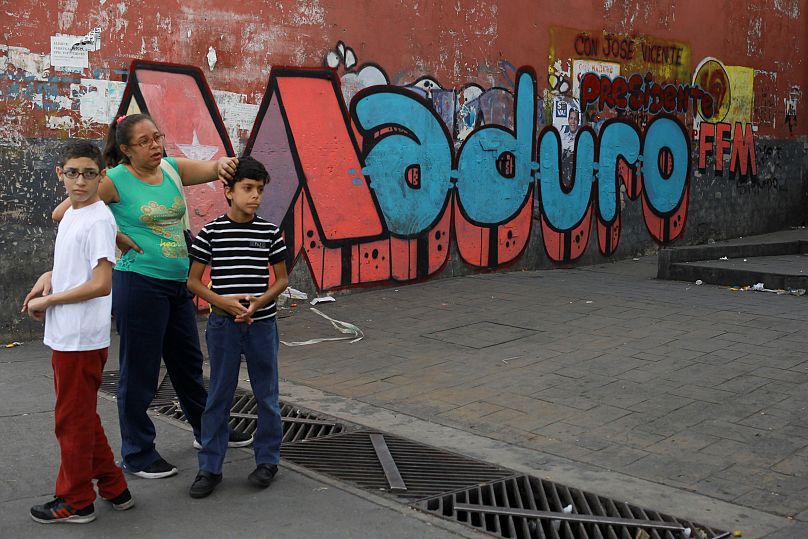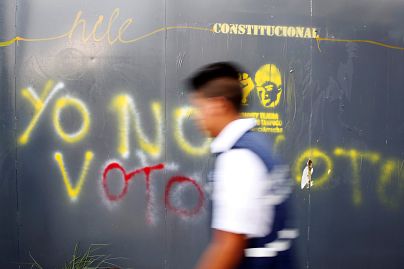This Sunday, Venezuelans will go to the polls in snap elections called by the government to elect their future president. Many believe that Nicolas Maduro will be elected for a second term but the Chavista president has lost a lot of support over the years.
To the surprise of many, Venezuela will be holding early presidential elections on Sunday. The US and the EU have condemned Venezuelan President Nicolas Maduro's decision to hold the snap vote and said they might impose more sanctions on the country if "democracy is undermined".
Maduro was elected president of Venezuela after Hugo Chavez' sudden death in 2013. He's ruled by decree for the majority of his presidency.
However, growing discontent with the poor state of things in Venezuela may not favour Maduro as much as people think, according to assistant professor of sociology at the University of North Carolina Tim Gill.
"My understanding is that people still believe in Chavismo [left-wing political ideology from former President of Venezuela Hugo Chavez] but don't support Maduro," Gill told Euronews. "In many polls, Chavez is still the most popular politician in Venezuela."
According to Gill, Maduro doesn't have the ability Chavez had to inspire or dazzle the crowd.
"It seems like a classic case of power transfer where a charismatic leader [Chavez] was able to pull things together and run the state in a proper way and the one that takes over [Maduro] looks like an impostor."
Gill says that Maduro's lack of change has also hurt his image.
"There was a great deal of corruption under Chavez but at least he could get things done and could manage the military and the bureaucracy in a way that worked. Maduro doesn't want to make any changes because there are individuals seemingly in the military that are benefitting from the [current] economic arrangements."
The Venezuela expert added that the polls actually show a high unfavourability for Maduro.
"If everybody in the country voted it's pretty clear that opposition leader Henri Falcon would win. But whether or not people will come out to the polls is another story."
Less credibility
Another factor that might hurt Maduro on Sunday is that these elections are seen as less credible for a number of reasons, said Gill.
International observers from the US and the EU are not being allowed to monitor the voting because Maduro believes they're not needed.
Claims of alleged interference with electoral results in the southeastern state of Bolivar have also made people skeptical that this could happen elsewhere in the country.
The creation of the National Constituent Assembly — an all-powerful parallel legislative body voted in last year tasked with drafting a new constitution — was condemned by the opposition who boycotted the vote to choose members of the new constituent assembly and foreign powers like the US and Spain who said they would not recognise the outcome of the vote.
All of these factors have made Maduro even less popular with its regional neighbours, who see him as an incompetent leader, said Gill.
Odds are with Maduro
But despite the president's waining popularity, the expert said that the odds stand with Maduro.
The main opposition, the Democratic Unity coalition, has decided to boycott the elections and has refused to present any candidates. Henri Falcon of the Progressive Advance is standing as an independent candidate as well as Javier Bertucci.
The two most popular opposition figures, Leopoldo Lopez and Capriles, are both banned from standing.
For Gill, boycotting the elections will only hurt the opposition and help Maduro secure another term as president of Venezuela.
"This is a strategy that many opposition parties have tried in other countries and it never has the desired results," he said.
What will happen after Sunday's election?
Whoever wins the election will have to face the country's crumbling economy, hyperinflation, and the lack of basic necessities.
Venezuela is currently undergoing one of the worst economic and social crisis in the country's history, with millions suffering food and medicine shortages, hyperinflation, and growing insecurity, which critics say is the result of the dysfunctional Maduro government. As a result, an estimated three million people have fled the country.
If he wins, says Gill, "Maduro may hand over some of the oil ventures to China and Russia so they can invest their capital in them."
Venezuela has one of the largest oil reserves in the world but the country's economic malaise has the country operating at less than 40% of its total potential output.
But other than that, Gill believes that Maduro's second term as president would be much of the same.
Falcon, on the other hand, has promised to use the US dollar instead of the hyperinflated Bolivar to try to stabilise the economy. He's also said he would accept foreign aid into Venezuela, free opposition activists, and perhaps work with the IMF to revamp the economy.













